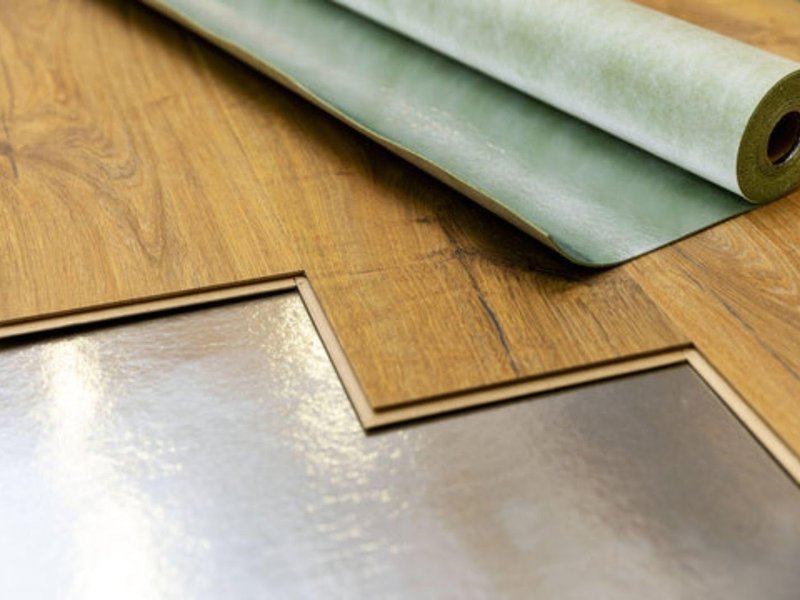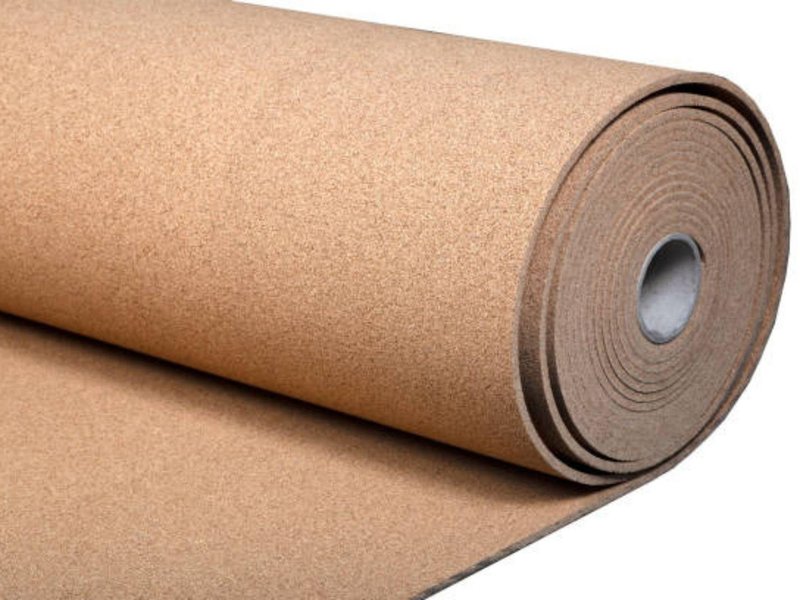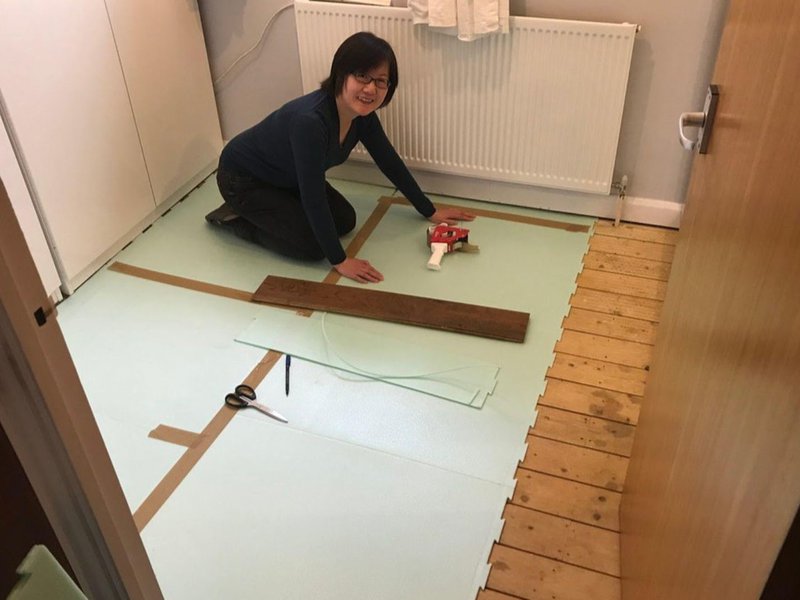
Although many homeowners desire true hardwood floors in their homes, they find that cost prevents them from installing them. When it comes to alternatives for your flooring project, luxury vinyl plank flooring, with the new technologies, can provide the same look and texture of wood floors. Don’t let the resemblance fool you into thinking it’s an inferior product either, as vinyl plank flooring has many advantages not found with hardwood.
When installing luxury vinyl in your home, you may be wondering, “Do I need an underlayment for vinyl plank flooring?” The answer to this question isn’t a cut-and-dry yes or no. Let’s look at what underlay is, its benefits, and whether or not you need it for your residential flooring.
What Exactly is Underlayment?
Your flooring is composed of a variety of important elements that contribute to its overall function. Structurally, you have joists that are laid at the beginning of the construction process and support the weight of the flooring. On top of the joists rests the subfloor, which can be made of a variety of materials, but most commonly plywood.
Underlay sits on top of the subfloor and rests beneath the finish floor (hardwood, plank flooring, carpeting, etc). Underlay is not structural, however, it serves a variety of important functions.
In some cases underlayment is optional, and this decision depends on various factors that we’ll address further down in this article. For now, we’ll discuss the advantages that underlayment provides.
Source: The Spruce
Benefits of Installing Underlay in Your Flooring Project
While underlay doesn’t help support the weight of the flooring, or serve any structural purpose, it’s still quite useful, and can affordably be purchased by the square foot. There are numerous benefits that underlayment provides, including:
- Floor Softening: Unless you’re installing carpeting, the flooring you put into your home is likely quite hard. When hardwood and luxury vinyl planks are installed directly on the subfloor, there’s zero cushion between the materials. Adding underlay allows your flooring to “bounce” a little as you walk across it, softening how it feels beneath your feet.
- Sound Reduction: When your flooring is installed directly on the subfloor, friction is created every time you step on it. When these two materials rub together, it can cause squeaking. Underlayment creates a barrier between them, promoting noise reduction in your home.
- Moisture Protection: Many underlayments creates a moisture barrier between your home and the subfloor. This is crucial as water can damage the integrity of plywood.
- Insulation: A thick underlay provides insulation properties that can help keep your floors warmer in the winter. Your subfloor can become quite cold during the colder months, and having an underlay adds insulation that keeps the cold out. Underlay mitigates this.
- Better Installation: Underlayment provides a smooth surface that has less friction than the plywood or concrete subfloor, making it easier to slide and position the flooring when using a click-together installation.
Source: Hunker
Types of Underlay

There are a few types of underlayment available, made from different materials used, including rubber, cork, felt, and foam. Some underlayment also include and antimicrobial component that reduces the risk of mold caused by moisture.
When Do I Need Underlayment for Vinyl Plank Flooring?
There are a variety of considerations to make when deciding whether or not you’ll need to underlay your vinyl plank flooring installation. While the benefits discussed are tough to beat, in some circumstances you don’t technically need underlayment.
Depending on your type of subfloor or the flooring you’re installing vinyl on top of, you may or may not need underlayment. The type of flooring also determines which type of underlayment you should buy if it’s needed. Different types of subfloors have different properties that may warrant one style of underlayment over another, and different installation methods have different underlayment needs. Stick-on, glue down, and loose lay vinyl don’t require an underlay. It’s always best to check with the manufacturer, or flooring dealer, and follow their recommendations.
Finally, some luxury vinyl planks come with a built-in underlayment that provides sound dampening and softening qualities. In this case, you’ll only need to install moisture and vapor barriers if installed over damp surfaces like concrete.
Do I Need Underlayment for Vinyl Plank Flooring on Concrete?
If your home’s subfloor is made of concrete, you will absolutely need an underlayment if installing luxury vinyl plank flooring. While concrete is an exceptionally durable construction material, it has a few inherent properties that don’t play nicely with the flooring of your home. The reasons why concrete needs underlayment includes:
- Moisture Secretion: Concrete is naturally porous, meaning moisture, humidity, and vapors can travel right through it. Moisture is always moving within the concrete, and the material can secrete from it over time. This may result in mold that can be particularly damaging to your home. If installing over concrete, use a underlayment that has a moisture barrier built in.
- Hard Material: If vinyl plank flooring is installed directly on the concrete, it will be incredibly stiff to walk on. Adding an underlayment made of foam, cork, or rubber will allow some suspension beneath your feet as you enjoy the home.
- Thermal Regulation: Concrete is exceptionally cold in the winter, and this can cause the flooring in your home to be uncomfortably cold as well. Underlay will help block the coolness that comes off of the concrete.
Do I Need Underlay for Vinyl Plank Floor Installed Over Ceramic Tile?
Unlike concrete, an underlayment is not an absolute necessity for installing vinyl plank floors over ceramic tile, however, it is still highly recommended. Tile has some properties to it that can benefit from installing an underlay and will allow you to enjoy your vinyl flooring more thoroughly.
When looking for the proper underlayment for tile, you won’t need to worry about a product with moisture protection. Tile doesn’t secrete any water as concrete does, so there is less of a risk of mold caused from moisture.
Tile is a hard surface though, and you’ll experience the same stiffness as concrete when vinyl flooring is installed directly to it. Consider adding underlay simply for the cushion it provides. Tile can also be cold in the winter, so the insulation benefits of an underlayment apply as well.
One main advantage of installing an underlay between tile and vinyl is that it skips the need to fill in the grout lines. You’ll need to choose a thicker underlay option to keep those grout lines from showing through the vinyl floor. If you choose not to install an underlay, every single grout line will need to be leveled to meet the rest of the floor.
Do I Need Underlay for Vinyl Plank Flooring Over Plywood?

It’s highly recommended that an underlayment is installed when placing a vinyl plank floor over a plywood subfloor. Plywood has a few weak aspects that an underlay can address.
Firstly, if water gets into the subfloor and is allowed to stay there, it can easily rot your plywood. This would be a disaster for your home, as all of the floorings will need to be removed to address the problem. Once rot starts, it can easily spread and the structural integrity of your floor can be affected. Even if you have waterproof vinyl flooring, an underlayment will prevent spills from permeating into your subfloor.
Plywood is also incredibly noisy when the flooring is installed directly to it, due to the friction and movement between the floors as discussed earlier. A sound-dampening underlay, that also offers moisture protection, would be your best choice.
If you’re at the beginning of your flooring journey and are interested in luxury vinyl plank flooring, Heritage Floor Coverings has an extensive selection for you. Get started today and browse all of our options.

